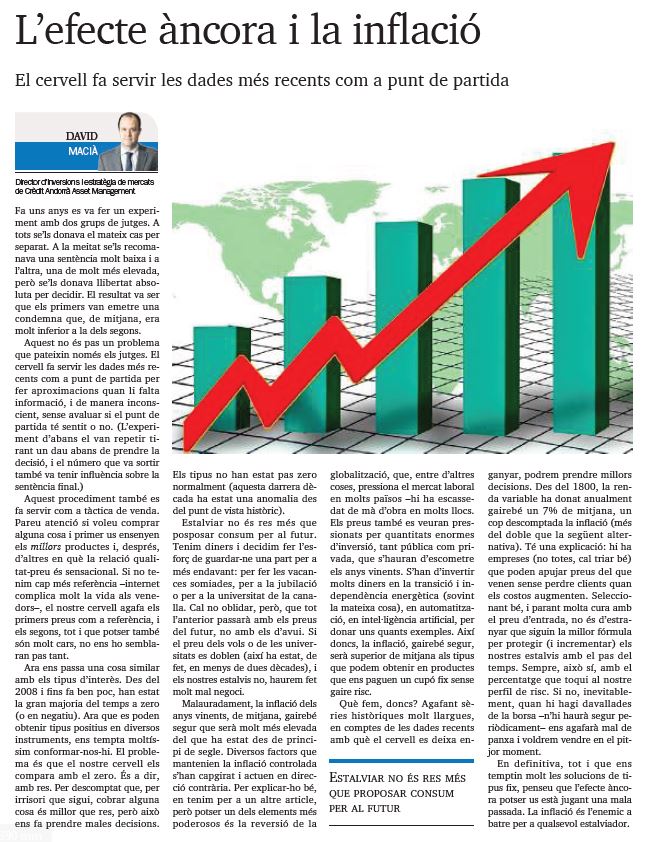A few years ago, an experiment was done with two groups of judges. All were separately given the same case. Half were recommended to hand down a very low sentence and the other a much higher one, but they were given absolute freedom to decide. The result is that the first group issued a conviction that was, on average, much lower than the latter group.
This is not a problem that only judges have. The brain uses the most recent data as a starting point to make approximations when it lacks information. It does so unconsciously, without evaluating whether the starting point makes sense or not (the experiment was repeated by rolling dice before making the decision, and the number on the dice also had an influence on the final sentence!). It’s also used as a sales tactic. Pay attention to whether someone is going to buy something and first show them the ‘best’ products, and then others which offer amazing ‘value for money’. If we don’t have anything else to base the decision on – the Internet makes life very complicated for sellers – our brain takes the initial prices as a reference, and the second ones, although they may also be very expensive, don’t seem so expensive by comparison.
Something similar is happening to us now with interest rates. From 2008 until very recently, they have been at zero (or negative) the vast majority of the time. Now that positive interest rates can be obtained, in various instruments, we are very tempted to settle. The problem is that our brain compares it to zero. With nothing, in other words. Of course, no matter how paltry, getting paid something is better than nothing at all. But that leads us to make bad decisions. Rates have not normally been at zero (this last decade is an anomaly, from a historical point of view).
Saving is nothing more than postponed future spending. We have money and we decide to make the effort to save some for later. To take a dream holiday, for retirement or to pay for our children’s university studies. We must not forget, however, that we will have to do all of the above with the prices of the future, not those of today. If the price of flights or universities doubles (which they have done, in fact, in less than two decades), and our savings don’t, we will have not made very wise business decisions.
Unfortunately, inflation over the next few years, on average, will almost certainly be much higher than it has been since the turn of the century. Several factors that kept inflation under control have reversed and are having an opposite effect. Explaining this would take up another article, but perhaps one of the most powerful factors is the reversal of globalisation, which among other things adds pressure to the labour market in many countries, resulting in a shortage of labour in many places. Pressure will also be exerted on prices by enormous the amounts of investment, both public and private, that will have to be undertaken in the coming years. A lot of money must be invested in energy transition and independence (which often mean the same thing), as well as in automation and artificial intelligence, to give a few examples. Inflation will therefore almost certainly be higher on average than the rates we can get for products that pay us a fixed coupon without much risk.
So, what should we do? By taking a very long historical view instead of just recent data that fools the brain, we will be able to make better decisions. Since 1800, on average variable income has yielded almost 7% annually, once inflation has been discounted (more than twice as much as the next alternative). There is an explanation. There are companies (not all of them: you have to choose well!) that can raise the prices of what they sell without losing customers when costs go up. Selecting well, and paying great attention to the entry price, it is not surprising that they are the best formula to protect (and increase) our savings, over time. Always, of course, with the percentage that corresponds to our risk profile. If not, inevitably, when there are declines in the stock market – which are sure to occur periodically – we will have a stomach ache and we will want to sell at the worst moment.
In short, although we are very tempted by fixed-type solutions, the power of the anchoring effect might be playing a trick on you. Inflation is the enemy to beat for anyone that wants to save money.

Published at Diari d’Andorra 21.12.2023